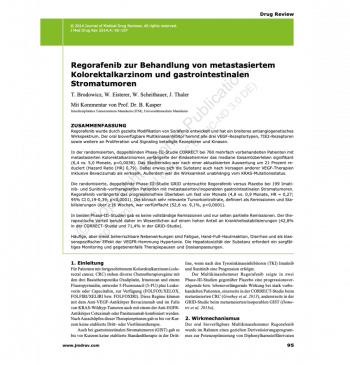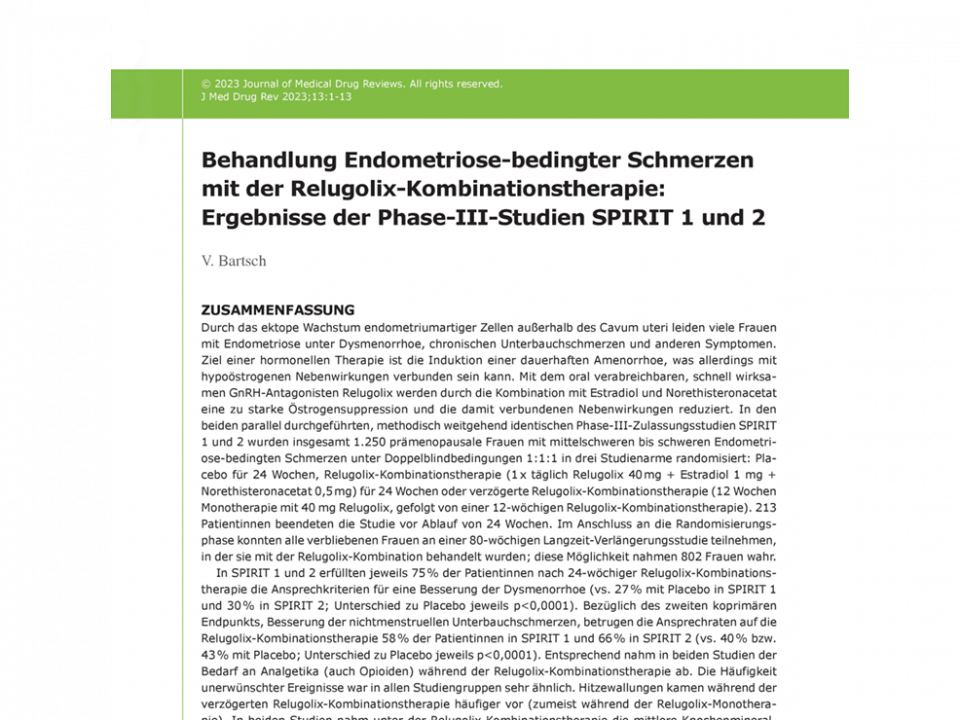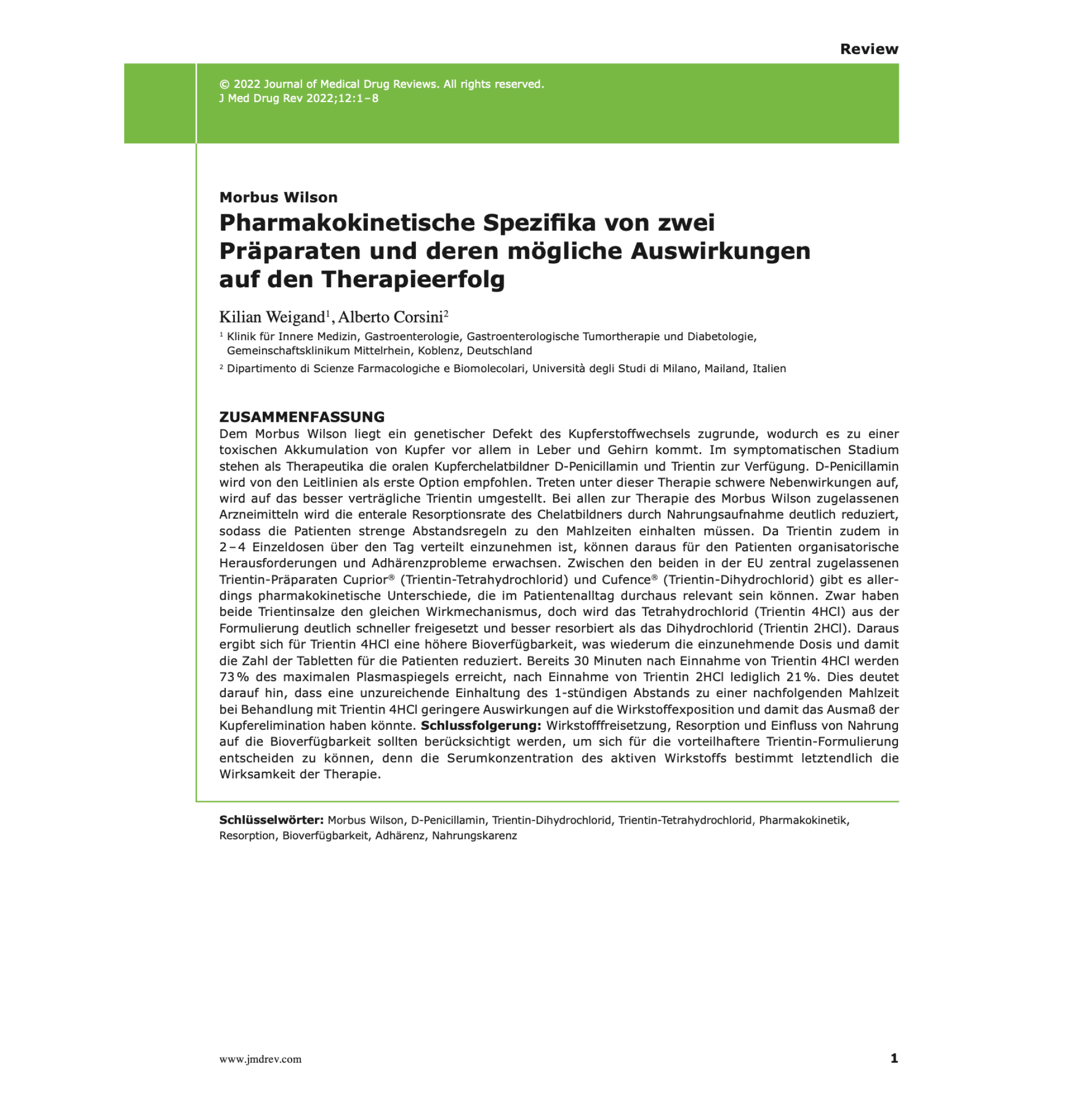Regorafenib zur Behandlung von metastasiertem Kolorektalkarzinom und gastrointestinalen Stromatumoren
J Med Drug Rev 2014;4:95–107
Regorafenib wurde durch gezielte Modifikation von Sorafenib entwickelt und hat ein breiteres antiangiogenetisches Wirkspektrum. Der oral bioverfügbare Multikinaseinhibitor hemmt alle drei VEGF-Rezeptortypen, TIE2-Rezeptoren sowie weitere an Proliferation und Signaling beteiligte Rezeptoren und Kinasen.
In der randomisierten, doppelblinden Phase-III-Studie CORRECT bei 760 mehrfach vorbehandelten Patienten mit metastasierten Kolorektalkarzinomen verlängerte der Kinasehemmer das mediane Gesamtüberleben signifikant (6,4 vs. 5,0 Monate, p=0,0038). Das Sterberisiko war nach einer aktualisierten Auswertung um 21 Prozent reduziert (Hazard Ratio [HR] 0,79). Dabei erwies sich die Substanz auch nach Versagen anderer VEGF-Therapien inklusive Bevacizumab als wirksam. Außerdem war die Wirksamkeit unabhängig vom KRAS-Mutationsstatus.
Die randomisierte, doppelblinde Phase-III-Studie GRID untersuchte Regorafenib versus Plazebo bei 199 Imatinib- und Sunitinib-vortherapierten Patienten mit metastasierten/inoperablen gastrointestinalen Stromatumoren. Regorafenib verlängerte das progressionsfreie Überleben um fast vier Monate (4,8 vs. 0,9 Monate, HR = 0,27;95% CI 0,19-0,39; p<0,0001). Die klinisch sehr relevante Tumorkontrollrate, definiert als Remissionen und Stabilisierungen über =16 Wochen, war verfünffacht (52,6 vs. 9,1%, p<0,0001).
In beiden Phase-III-Studien gab es keine vollständige Remissionen und nur selten partielle Remissionen. Der therapeutische Vorteil beruht daher im Wesentlichen auf einem hohen Anteil an Krankheitsstabilisierungen (42,8% in der CORRECT-Studie und 71,4% in der GRID-Studie).
Häufige, aber meist beherrschbare Nebenwirkungen sind Fatigue, Hand-Fuß-Hautreaktion, Diarrhoe und als klassenspezifischer Effekt der VEGFR-Hemmung Hypertonie. Die Hepatotoxizität der Substanz erfordert ein sorgfältiges Monitoring und gegebenenfalls Therapiepausen und Dosisanpassungen.
Regorafenib in the treatment of metastatic colorectal cancer and gastrointestinal stromal tumour
Regorafenib has been developed by targeted modification of sorafenib and exhibits a broaderantiangiogenic activity. The orally bioavailable multi-kinase inhibitor suppresses all three types of VEGF receptors, Tie2 receptors and other receptors and kinases involved in proliferation and signalling. In the randomized,double-blind phase 3 trial CORRECT, the multi-kinase inhibitor significantly prolonged median overall survival in 760 highly pretreated patients with metastatic colorectal carcinoma (6.4 versus 5.0 months, p=0,0038). According to an updated analysis, mortality risk was reduced by 21 percent (Hazard Ratio [HR] 0.79). The compound proved to be effective even after other anti-VEGF therapies including bevacizumab had failed. Moreover, efficacy was independent from KRAS mutation status.
The randomized, double-blind phase 3 trial GRID investigated regorafenib versus placebo in 199 patients with metastatic and/or inoperable gastrointestinal stromal tumors who had previouslybeen treated with imatinib or sunitinib. Regorafenib increased progression-free survival by almost four months (4.8 versus 0.9 months, HR = 0.27; 95% CI 0.19-0.39; p<0.0001). The clinically highly important tumor control rate, which is defined as remissionordisease stabilization for =16 months, was increased by five times (52.6 vs. 9.1%, p<0,0001). However, in both phase 3 trials there were no complete remissions and very few cases of partial remission. Thus, the therapeutic benefit is primarily based on a high rate of disease stabilizations (42.8% in CORRECT and 71.4% in GRID).
Common, but mostly manageable side effects include fatigue, hand-foot skin reactions, diarrhea and hypertension, the latter being a class side effect of VEGF inhibitors. Given the hepatotoxicity of the compound careful monitoring is necessary, as might be treatment interruptions and dose adjustments.
Regorafenib wurde durch gezielte Modifikation von Sorafenib entwickelt und hat ein breiteres antiangiogenetisches Wirkspektrum. Der oral bioverfügbare Multikinaseinhibitor hemmt alle drei VEGF-Rezeptortypen, TIE2-Rezeptoren sowie weitere an Proliferation und Signaling beteiligte Rezeptoren und Kinasen.
In der randomisierten, doppelblinden Phase-III-Studie CORRECT bei 760 mehrfach vorbehandelten Patienten mit metastasierten Kolorektalkarzinomen verlängerte der Kinasehemmer das mediane Gesamtüberleben signifikant (6,4 vs. 5,0 Monate, p=0,0038). Das Sterberisiko war nach einer aktualisierten Auswertung um 21 Prozent reduziert (Hazard Ratio [HR] 0,79). Dabei erwies sich die Substanz auch nach Versagen anderer VEGF-Therapien inklusive Bevacizumab als wirksam. Außerdem war die Wirksamkeit unabhängig vom KRAS-Mutationsstatus.
Die randomisierte, doppelblinde Phase-III-Studie GRID untersuchte Regorafenib versus Plazebo bei 199 Imatinib- und Sunitinib-vortherapierten Patienten mit metastasierten/inoperablen gastrointestinalen Stromatumoren. Regorafenib verlängerte das progressionsfreie Überleben um fast vier Monate (4,8 vs. 0,9 Monate, HR = 0,27;95% CI 0,19-0,39; p<0,0001). Die klinisch sehr relevante Tumorkontrollrate, definiert als Remissionen und Stabilisierungen über =16 Wochen, war verfünffacht (52,6 vs. 9,1%, p<0,0001).
In beiden Phase-III-Studien gab es keine vollständige Remissionen und nur selten partielle Remissionen. Der therapeutische Vorteil beruht daher im Wesentlichen auf einem hohen Anteil an Krankheitsstabilisierungen (42,8% in der CORRECT-Studie und 71,4% in der GRID-Studie).
Häufige, aber meist beherrschbare Nebenwirkungen sind Fatigue, Hand-Fuß-Hautreaktion, Diarrhoe und als klassenspezifischer Effekt der VEGFR-Hemmung Hypertonie. Die Hepatotoxizität der Substanz erfordert ein sorgfältiges Monitoring und gegebenenfalls Therapiepausen und Dosisanpassungen.
Regorafenib in the treatment of metastatic colorectal cancer and gastrointestinal stromal tumour
Regorafenib has been developed by targeted modification of sorafenib and exhibits a broaderantiangiogenic activity. The orally bioavailable multi-kinase inhibitor suppresses all three types of VEGF receptors, Tie2 receptors and other receptors and kinases involved in proliferation and signalling. In the randomized,double-blind phase 3 trial CORRECT, the multi-kinase inhibitor significantly prolonged median overall survival in 760 highly pretreated patients with metastatic colorectal carcinoma (6.4 versus 5.0 months, p=0,0038). According to an updated analysis, mortality risk was reduced by 21 percent (Hazard Ratio [HR] 0.79). The compound proved to be effective even after other anti-VEGF therapies including bevacizumab had failed. Moreover, efficacy was independent from KRAS mutation status.
The randomized, double-blind phase 3 trial GRID investigated regorafenib versus placebo in 199 patients with metastatic and/or inoperable gastrointestinal stromal tumors who had previouslybeen treated with imatinib or sunitinib. Regorafenib increased progression-free survival by almost four months (4.8 versus 0.9 months, HR = 0.27; 95% CI 0.19-0.39; p<0.0001). The clinically highly important tumor control rate, which is defined as remissionordisease stabilization for =16 months, was increased by five times (52.6 vs. 9.1%, p<0,0001). However, in both phase 3 trials there were no complete remissions and very few cases of partial remission. Thus, the therapeutic benefit is primarily based on a high rate of disease stabilizations (42.8% in CORRECT and 71.4% in GRID).
Common, but mostly manageable side effects include fatigue, hand-foot skin reactions, diarrhea and hypertension, the latter being a class side effect of VEGF inhibitors. Given the hepatotoxicity of the compound careful monitoring is necessary, as might be treatment interruptions and dose adjustments.




